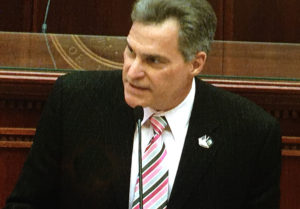
© 2017 by Steve Brawner Communications, Inc.
Should college and university employees with concealed carry permits be allowed to bring their weapons on campus, and, just as importantly, who should make that decision? That’s what’s being debated in the Legislature.
House Bill 1249 by Rep. Charlie Collins, R-Fayetteville, would require the state’s higher education institutions to allow staff members to carry guns. Four years ago, he passed a similar bill with one major difference: When faced with opposition from colleges and universities, he amended it to let them opt out. All of them did. House Bill 1249 would not let them opt out.
The bill has advanced through the House Judiciary Committee and the full House of Representatives. It passed easily both times over token Democratic opposition, which, these days, is about the only kind. It next was to appear before the Senate Judiciary Committee, where Republicans compose seven of the eight committee slots. If it passes there, it’s on its way to becoming law. Prior to the session, Gov. Asa Hutchinson said he was comfortable letting institutions set their own policies. He hasn’t taken a position on the bill, but don’t look for him to veto it.
Collins thoroughly laid out his case before the committee and the full House. He recited a grim list of public massacres and then cited research showing these attacks are not random. Instead, the killers coldly and calculatingly prepare their deeds in order to gain attention and air their grievances. After perhaps targeting a few victims, they shoot randomly with no plan for escape.
There is no way for law enforcers to prevent this, he argues, and no way officers can respond before people are dead and wounded. Most attacks end with an intervention by administrators, faculty, or students or by the actions of the attackers themselves. That means society’s best chance is to make it easier for someone on the scene to neutralize the attacker. Meanwhile, because these attacks are plotted, the fact that someone on campus could have a gun might make the plotter consider another target.
Could the risk of gun accidents outweigh the potential benefits? Collins says no. The bill would not allow students to carry a concealed weapon or allow weapons to be stored in dorms. Arkansas has a very good concealed carry permitting process that prevents crazies from getting a license. In fact, permit holders statistically are more law-abiding even than law enforcement officers.
That’s Collins’ argument. Colleges and universities, on the other hand, do not want more guns on campus. They say they and their law enforcers are better able to decide how to keep their campuses safe than legislators in Little Rock. There’s a concern that arming only the professors and staff means they become the first targets.
Steve Gahagans, chief of police at the University of Arkansas Police Department – a 33-year veteran law enforcer who speaks like a veteran – told legislators that only law enforcers are trained to control for their own biases and to consider what’s behind the target. He said even with all of his training, in simulated scenarios he sometimes shoots the wrong person. Campus police can be on the scene within about two minutes. When they arrive, it makes their job harder when they have to decide which person with the gun is the bad guy.
You can’t go wrong taking a pro-gun stance in most places in Arkansas, and Collins knows that. The National Rifle Association supports the bill, and woe unto any Republican who gets on the NRA’s bad side. Still, he’s willingly spoken before town halls in Fayetteville and Conway where the crowd vocally opposed him. That’s not easy to do.
Collins’ bill pits conservative principles against each other – security and the personal freedom to carry a firearm versus the idea that decisions are best made locally by those most affected. He freely admits there’s a conflict in values, but, in the marbled halls of the State Capitol, there often is. You make choices.
Each legislator is making a choice on this bill. If it passes, college and university administrations will not have one. On the other hand, staff members with concealed carry permits will have more choice.
Whose choice matters most? It’s a representative democracy, so in this case it’s the legislators. Emotions can get high on this kind of thing, so let’s remember this: Whether or not you’re for the bill, we’re all against the killers.
This is an example of liberal big government taking away local control. lol